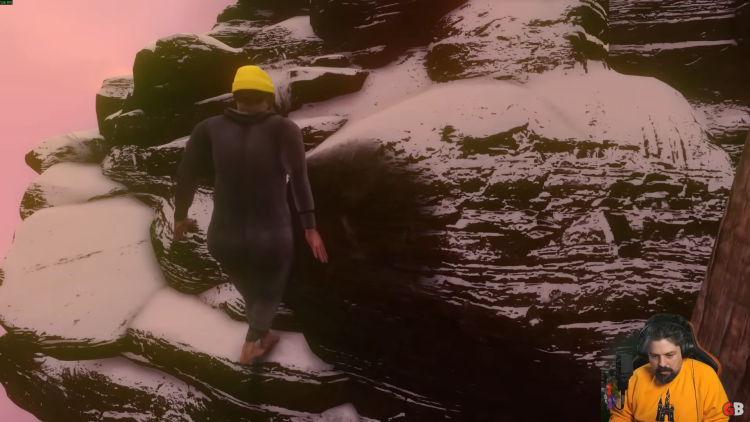Baby Steps’ Giant Staircase Scene Offers One of Gaming’s Most Unexpected Emotional Choices
Baby Steps, the new physics-based adventure from Ape Out creators Gabe Cuzzillo, Bennett Foddy, and Maxi Boch, hides one of the most memorable choices seen in recent gaming. What appears to be a simple walking simulator quickly transforms into a story of insecurity, self-discovery, and acceptance — all embodied in a single choice between a deadly mountain trail and a massive spiral staircase.
The game follows Nate, an unemployed man-child who suddenly finds himself transported from his parents’ basement into a surreal, open world. Struggling to move on his unsteady legs, he must navigate the environment step by step, a mechanic that provides both humor and frustration. The physical awkwardness of the gameplay mirrors Nate’s emotional discomfort, building a connection between his clumsy movements and his inner turmoil.
Throughout his journey, Nate encounters a range of eccentric characters who offer him help. However, his pride and insecurity often stop him from accepting assistance. In one early scene, a confident hiker tries to hand him a map, only for Nate to awkwardly decline it. In another, when he falls into a pit and is offered a ladder to escape, he pretends that he prefers being trapped. These moments highlight a recurring pattern of denial and self-sabotage that defines Nate’s character.
That theme reaches its peak near the end of the game. As Nate approaches the final stage of his journey, he faces a decision that encapsulates his entire character arc. The world’s groundskeeper, a recurring figure who Nate has tried to avoid, presents him with two paths to reach the mountaintop. The first is “The Manbreaker,” a long, punishing trail filled with hazards and treacherous climbs. The second is a much easier option — a towering spiral staircase that leads directly to the top.
If Nate chooses the stairs, he must agree to address the groundskeeper as “Lord” from then on.
The decision, though humorous at first, becomes a moment of deep emotional significance. Taking on The Manbreaker represents a test of strength and pride, a way for Nate to prove to himself that he’s capable and masculine enough to conquer the hardest path. It’s a symbolic fight against his own insecurities, even if it means enduring unnecessary pain.
On the other hand, choosing the staircase represents something quieter but equally meaningful — the willingness to accept help without shame. After countless moments of rejecting kindness and sabotaging his own progress, the staircase offers a rare chance for Nate to show humility and trust. The design of Baby Steps makes this moment unexpectedly tense, as players grow suspicious of anything that seems too easy. The game frequently tricks them with traps disguised as shortcuts, forcing hesitation even in moments that appear safe.
Players who choose the stairs quickly learn that it isn’t a trap. The climb is long but manageable, and there are no cruel surprises waiting. Midway through, Nate even meets the hiker again, who has chosen The Manbreaker route and appears exhausted, quietly regretting the difficult path. By the time Nate reaches the top and fulfills his promise to call the groundskeeper “Lord,” the moment carries no bitterness. After hours of struggle, the surrender feels more like peace than defeat.
Here’s Baby Steps on Steam; you can check the reviews by yourself!

The scene captures the essence of what Baby Steps tries to communicate — not through dialogue, but through player action. Every stumble and misstep builds to this choice, transforming it into a genuine act of character development. Both paths lead to meaningful outcomes, but the choice reflects the player’s own interpretation of Nate’s growth.
Baby Steps uses this balance of comedy and sincerity to elevate its simple premise. The awkward physics and absurd situations hide a story about vulnerability and the courage to accept imperfection. By the time players reach the mountain’s summit, the act of climbing — whether by stairs or trail — becomes more than a test of skill. It’s a reflection of how Nate learns to move forward, one deliberate step at a time.
Developed by Cuzzillo, Foddy, and Boch and published by Devolver Digital, Baby Steps blends experimental gameplay with storytelling depth. Its final act stands out not because of a twist or a dramatic ending, but because it quietly gives players the freedom to decide what growth means for Nate — through a single, deceptively simple choice.

Comments